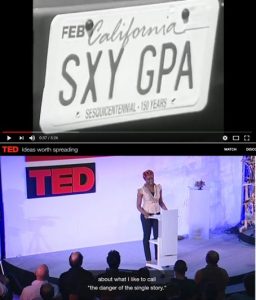Sexy Grandpa and The Danger of a Single Story
 At the beginning of each class for first semester composition, I typically screen a short film. During our last class, my selection was Sexy Grandpa (5:26) which is set in an assisted living residence. When a new male resident arrives, two female friends vie for his attention. At the climax of the film, neither of the women are successful in winning sexy grandpa’s heart which is captured by another male resident.
At the beginning of each class for first semester composition, I typically screen a short film. During our last class, my selection was Sexy Grandpa (5:26) which is set in an assisted living residence. When a new male resident arrives, two female friends vie for his attention. At the climax of the film, neither of the women are successful in winning sexy grandpa’s heart which is captured by another male resident.
After the film was screened, some students said that they saw the ending coming—not because of what they had viewed in the film—but rather because the films I show to the class tend to have a twist at the end. For example, previous films have included
- Lovefield (5:28) which appears to be a horror film depicting an assault in a corn field, but which is actually the story of a man who has helped a woman give birth to a baby boy.
- A Man Walks Into a Bar… (6:09) which appears to show a man picking up a prostitute in a high class bar. Actually, both the man and the woman are both prostitutes who mistook each other for their respective clients.
- Safe House (2:57) which appears to show a young boy running through the woods trying to escape a predator when it is actually about a child playing hide and seek with his father.
Although Immersion (12:23) which is about a Spanish speaking boy forced to take a standardized math test in English and The Life and Death of a Pumpkin (4:56) which shows Halloween from the pumpkin’s point of view do not have twist endings, students have come to expect that even without a twist, things are not always as they seem.
Ironically, the day I screened Sexy Grandpa, I also screened Chimamanda Ngozi Adichie’s TED talk, The Danger of a Single Story (18:43).
Adichie explains that:
It is impossible to talk about the single story without talking about power. There is a word, an Igbo word, that I think about whenever I think about the power structures of the world, and it is “nkali.” It’s a noun that loosely translates to “to be greater than another.” Like our economic and political worlds, stories too are defined by the principle of nkali: How they are told, who tells them, when they’re told, how many stories are told, are really dependent on power.
As the most powerful person in the classroom, I need to make sure that I do not use my power to create a single classroom narrative because “The single story creates stereotypes, and the problem with stereotypes is not that they are untrue, but that they are incomplete.”
During our discussion, a student suggested that we watch a DNA spoof created for South Park (1:11). Anticipating that I might object to showing something from South Park, another student commented, “We are all adults here.” While the second student was correct, that is not the reason I consented to screening the DNA satire.
The fact that we are all adults is irrelevant to my pedagogical approach to empowering students. Students need to be empowered because that is the right thing to do. As a professor, I am aware that, in Adichie’s words, “The consequence of the single story is this: It robs people of dignity. It makes our recognition of our equal humanity difficult. It emphasizes how we are different rather than how we are similar.” As a professor, I do not want to teach in a classroom where students are robbed of their dignity and in which our mutual humanity is not recognized.
This does not mean that we cannot debate choices. Arguably, the DNA spoof could offend some colleagues in the classroom. But is the potential offense so great that the story should be banned even though the spoof clearly contributed to the discussion? When I screen Tous les hommes s’appellent Robert (5:50), someone might argue that the brief, full-frontal nudity in the film outweighs the pedagogical reasons for screening it. We need to be very careful before excluding stories from the classroom.
After our discussion of the single story I created by showing a certain type of film to begin classes, we decided to hold a film festival next week in which students would select films that exemplify stories they want to tell. I already assume that I will be incorporating some of their films into classes I am teaching next semester.
Adichie concludes her TED talk by reflecting “That when we reject the single story, when we realize that there is never a single story about any place, we regain a kind of paradise.” By empowering students to tell their stories, we create a kind of paradise that promotes student learning as well as our own.
- –Steven L. Berg, PhD
LEAVE A COMMENT